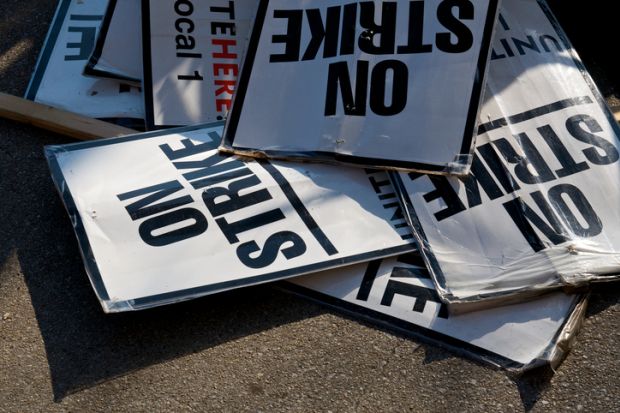Members of UK higher education’s main union have set a course for further industrial action over pay and pensions.
The University and College Union’s annual congress passed motions clearing the way for ballots on industrial action later this year on the 2019-20 pay offer from employers, and over the future of the Universities Superannuation Scheme.
On pay, delegates passed a motion stating that employers’ final offer of a 1.8 per cent rise “falls far short” of unions’ demands and that “a persistent failure to defend levels of HE pay undermines the viability of the UCU”.
UCU and other higher education unions had called for an increase equivalent to inflation as measured by the retail price index – currently 2.4 per cent – plus 3 per cent, or £3,349 – whichever is greater.
The conference motion resolves that the union should “initiate a concerted campaign to win industrial action ballots for a fight over pay to commence in the autumn”.
UCU called a ballot for strike action over a 2 per cent pay rise for 2018-19 and, while 70 per cent of voting members supported a walkout, the 41 per cent turnout was shy of the 50 per cent threshold required for industrial action.
On USS – the subject of a 14-day strike last year – delegates passed a motion calling for universities “to pick up any additional employee contributions” to the pension scheme from this October “and not pass them on”.
Employee and employer contributions increased at the start of April to 8.8 per cent and 19.5 per cent respectively, with fund managers warning of a multibillion-pound deficit. They are set to rise significantly from October, to 10.4 per cent and 22.5 per cent, before another hike next April, while fresh options to end the dispute which have been proposed by USS also involve increases in employee contributions.
If Universities UK does not agree to the union’s demand, it should “enter into dispute and prepare for an industrial action ballot in 2019”, the motion says. The conference set a deadline of 1 June for UUK to make a decision, with 1 September earmarked to start a ballot.
Further motions passed by congress called for the resignation of Bill Galvin, chief executive of USS, and criticised the decision of Trinity College, Cambridge, to withdraw from the scheme.
Trinity – one of the UK’s richest education institutions – cited concerns that it could be forced to meet the obligations of other universities that went bust.
The motion said it was “irresponsible” of the college to protect “its own assets ahead of the principle of mutuality in USS and the interests of higher education in the UK”, and called on union members to refrain from speaking engagements or other duties at Trinity.
A UCU spokesman said that the cost to Trinity’s reputation from leaving USS “will be far greater than the tiny risk of being left to carry the can for pensions if the higher education sector collapses”.
“The sector needs to work together to deliver high quality, guaranteed pensions and if Trinity does not reconsider its short-sighted decision it risks becoming a pariah institution,” a UCU spokesman said.
Register to continue
Why register?
- Registration is free and only takes a moment
- Once registered, you can read 3 articles a month
- Sign up for our newsletter
Subscribe
Or subscribe for unlimited access to:
- Unlimited access to news, views, insights & reviews
- Digital editions
- Digital access to THE’s university and college rankings analysis
Already registered or a current subscriber?








